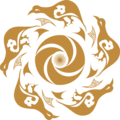A manuscript of the Quran has been discovered in Turkey’s Süleymaniye Library and is currently undergoing restoration.
This Quran was transcribed on golden sheets in 1318 by order of Uzbek Khan, the ruler of the Golden Horde, and is considered the main Quranic manuscript preserved after the Mongol era. According to Turkish professor Emek Üşenmez, the manuscript was brought to Istanbul as a trophy by Ottoman Sultan Mehmed the Conqueror following his campaign in Crimea in 1475.
“This is the first fully transcribed Quran created during the Mongol period in which the name 'Uzbek' is mentioned. All volumes of the Uzbek Khan Quran are adorned with gold, transcribed in the Golden Horde on gilded paper in the muhaqqaq style, and have been almost completely preserved to this day. The calligraphers of that time were highly skilled craftsmen, and their works were distinguished by elegance and precision. The Uzbek Khan Quran features intricate decorative elements, geometric patterns, and floral motifs. These elements enhance the manuscript's visual appeal and showcase the artistic styles prevalent in that era. It is precisely the complex technology and advanced methods of its time that make this manuscript exceptionally unique today,” noted Professor Emek Üşenmez.
It is reported that this manuscript holds special significance for Islamic culture and education. Moreover, it served as a means of preserving religious texts and promoting literacy among Muslim communities. Currently, the Center for Islamic Civilization in Uzbekistan, in collaboration with the World Society for the Study, Preservation, and Popularization of Uzbekistan’s Cultural Heritage, is working on restoring this unique manuscript and creating its facsimile copies with the aim of bringing it back to Uzbekistan.
